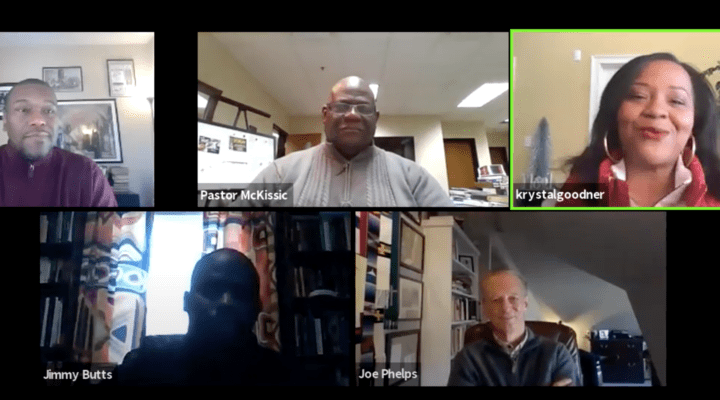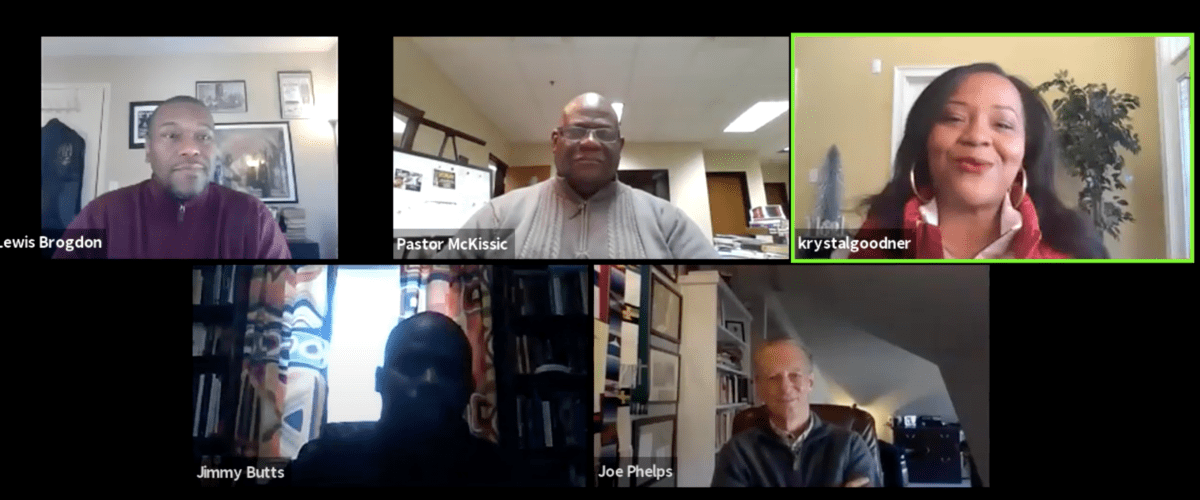Panelists at a Dec. 2 virtual forum on “Race and the Southern Baptist Theological Seminary” agreed the Louisville, Ky., school’s entanglements with slavery and racism demand a stronger response than the school has put forward.
However, participants in the West Louisville Forum expressed divergent views about the possibility of Blacks and whites working together to repair the moral breach created by slavery and racism at Southern Seminary and across the broader Christian landscape.
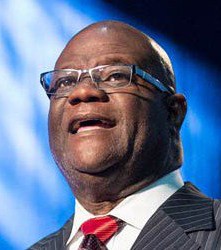
Dwight McKissic
Dwight McKissic, pastor of the predominantly Black Cornerstone Baptist Church in Arlington, Texas, said when Southern issued a 2018 report apologizing for slavery and racism, he urged the seminary to do more than express regret.
“Saying I’m sorry and doing nothing is not biblical repentance,” McKissic said. When challenged, he said the seminary agreed to provide $5 million in scholarships to African-American students over a five-year period.
However, McKissic said the school ignored the call to remove the names of Southern’s slaveholding founders from campus buildings. “It is not consistent with the faith to celebrate people who felt that Black people are less than,” he responded.
McKissic said he still recommends students to Southern, but he also has supported Black students who decided to leave. “Even after offering those scholarships, there is a mindset about the Black community at Southern, I’ve been told, that is really not healthy.” He did not elaborate about what he has heard.
McKissic was joined on the panel by Jimmy Butts, a Black graduate of Southern’s master of divinity program and a current Ph.D. student at the University of Louisville, and Joe Phelps, a retired Louisville pastor and co-chair of Empower West, a coalition of Black and white pastors committed to strengthening West Louisville, the city’s largest Black community. The forum, which was sponsored by Empower West and Simmons College of Kentucky, was moderated by Lewis Brogdon, a professor at Simmons and Baptist Seminary of Kentucky.
At Southern, racism is “in the DNA of the school,” Mckissic said. After being founded by four professors who were slaveholders, he said the school left its Deep South location in Greenville, S.C., after the Civil War looking for “white man’s territory” in Louisville.
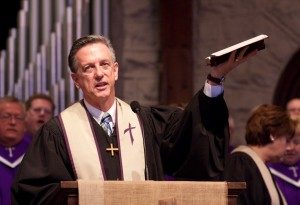
Joe Phelps
Phelps, who was a student at Southern in the 1970s, said over time he came to see how white supremacy shaped the school. “I came to a growing realization that what I had been taught at Southern, while profound and beautiful back in those days, was also laced and surrounded by white supremacy,” he said. “Everything spoke about white people and whiteness and the perpetuation of white systems.”
In his remarks opening the forum, Brogdon noted that schools, denominations, governments and other institutions over the past five years have begun to examine their ties to slavery. “We are in this period I would call a reckoning,” he said.
Their relationship to slavery included support for the practice and financial gain from it, he said. “Slavery generated wealth.”
When oppressive systems “privilege someone” they also “underprivilege someone else,” Brogdon added. Therefore, institutions need to respond both to their historic affirmations of slavery and their financial benefits from it.
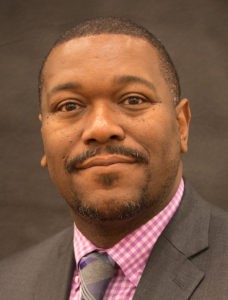
Lewis Brogdon
The failure of the white church to deal with racism has alienated people from Christianity and contributed to the growing number of unchurched people in the U.S, Brogdon said. “The white evangelical church and white Christianity are in serious trouble because of the failure to really give an honest reckoning of what has happened in this country, the enslavement of Africans, the genocide of native Americans, and all of these systems that uphold white privilege and just disenfranchise masses of Black and brown people. This just can’t go on.”
Phelps said he and other pastors from Empower West approached Southern in 2019 about making financial reparations to African Americans, but the overture went nowhere. “In fact, the whole request to enter into that conversation was kind of summarily dismissed and scoffed at.”
Despite setbacks, all panelists, with the exception of Butts, supported continued efforts to repair the breach between Black and white Christians and to work together to seek a more justice society.
Butts said white churches are ill equipped to address the racial divide because they are at the root of the problem. He recommended African Americans leave predominantly white churches and denominations.
“The white church merely perpetuates racial sins,” he said. “They actually created the context for it. They carried it out and then they created a theology essentially to be a get out of jail free card.”
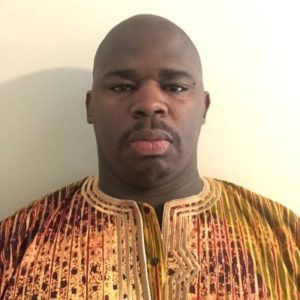
Jimmy Butts
Butts noted research has shown white nationalism and white extremist groups are often related to white churches. “The best way to eliminate white supremacy in America is for all white churches just to shut down,” he declared.
He said the Bible teaches “sometimes you have to die in order to live.”
While McKissic expressed understanding for Butts’ opinion, he disagreed with his fellow panelist, saying, “I’m not ready to give up on Dr. King’s dream.”
McKissic pointed out there “has always been a remnant of white men and women going back to the Civil Rights Movement” who support racial justice.
However, within the Southern Baptist Convention, there is an element that is “very racist,” McKissic said. “They don’t believe systemic injustice exists” anywhere in society.
This racist element, he said, gives uncritical support to President Donald Trump, but at the same time attacks Critical Race Theory, a school of thought that recognizes racism is engrained in American society.
“They have no problem with DJT, Donald Trump, but they have a huge problem with CRT,” he said. “I’m really concerned about that.”
Recently, presidents of the six Southern Baptist seminaries issued a statement that said “affirmation of Critical Race Theory, Intersectionality and any version of Critical Theory is incompatible with the Baptist Faith & Message,” the denomination’s statement of faith. Intersectionality deals with the ways people experience discrimination and marginalization.
In 2019, the SBC passed a resolution that affirmed the use of Critical Race Theory and Intersectionality “as analytical tools subordinate to Scripture and not as transcendent ideological frameworks.”
After the convention approved the resolution, it was widely criticized. For example, the Tennessee Baptist Convention denounced Critical Race Theory and Intersectionality “as inconsistent with a biblical worldview and theology.”
McKissic expressed support for the SBC’s resolution and the Resolution Committee that presented it, but he said, “The whole fallout and hoopla over the CRT report is a big to-do about nothing.”
“In one sense what the presidents did yesterday was somewhat insulate the committee’s work and keep it intact,” he observed.
“I, in some way, commend (the seminary presidents) for being consistent because I actually agree with them,” Butts said. “Critical Race Theory, which has as its goal to undermine white supremacy, is against the documents of the Southern Baptist Convention.”
Butts maintained white supremacy is not explicit in SBC documents, but he contended an “implicit reading” of them reveals racism. He compared them to the Declaration of Independence, which says “all men are created equal,” but Butts said the document really meant “all white men are created equal.”
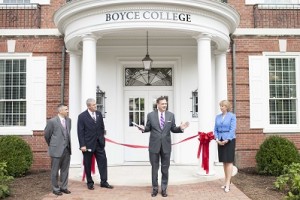
Southern Seminary President Al Mohler at the 2016 dedication of a facility for Boyce College, named for one of the seminary’s slaveholding founders.
Phelps emphasized that those who disagree with the SBC seminaries’ position on race should press them to change their beliefs. He said he has been in dialogue with Southern Seminary President Al Mohler for 23 years.
“I think we have to continue to implore them, put pressure on them,” Phelps said. “We don’t have legal pressure, but we’ve got the gospel. We’ve got the truth. We need to go to Al and these folks and say, ‘Come on, man, read your Bible, come let us reason together about these things that have happened.’”
Phelps acknowledged the seminary presidents’ statement has brought him close to declaring Southern Seminary a “lost cause.”
“Where they have gone at this point with their criticism of Critical Race Theory and just their refusal to even come to the table to talk about the damage they have done, I seriously question their validity as a Christian educational institution in this city,” he said.
Yet Phelps stressed Southern Seminary has the potential to make a major difference in bridging the racial divide.
“I’m inviting Al Mohler and Southern Seminary, the Southern Baptist Theological Seminary, to lead the way not only for Southern Baptists but for our nation to show us how repentance and repair can go hand in hand in creating a more just and a more equal society.”

